Article 67: Coffee celebrates life
Beyond material values, coffee has provided a way for the coffee drinker to empathize and celebrate the meaning of life.
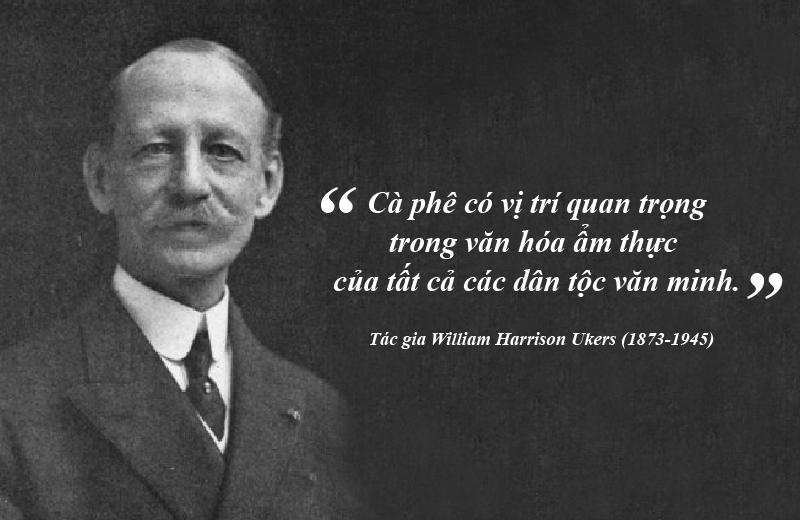
“Coffee has an important place in the culinary culture of all civilized peoples.” Author William Harrison Ukers (1873-1945)
Coffee – energy to discover new truth
Since the second half of the 20th century, the rapid development of information technology and the speed of globalization have completely changed the way people identify – nominate themselves in the world. Individuals make many conscious choices about their lifestyle. People gradually became highly skeptical of the great theories that used to be universal principles, they only accepted what they experienced themselves. Therefore, people constantly question what exists, discover what has never been, the truths that lie next to and parallel with the confirmed ones to find new values, new truths, new ways of life.
In that direction, enjoying coffee has also become a kind of social-cultural establishment to verify identity, reflect human outlook, showcase a new image for the coffee drinkers themselves.
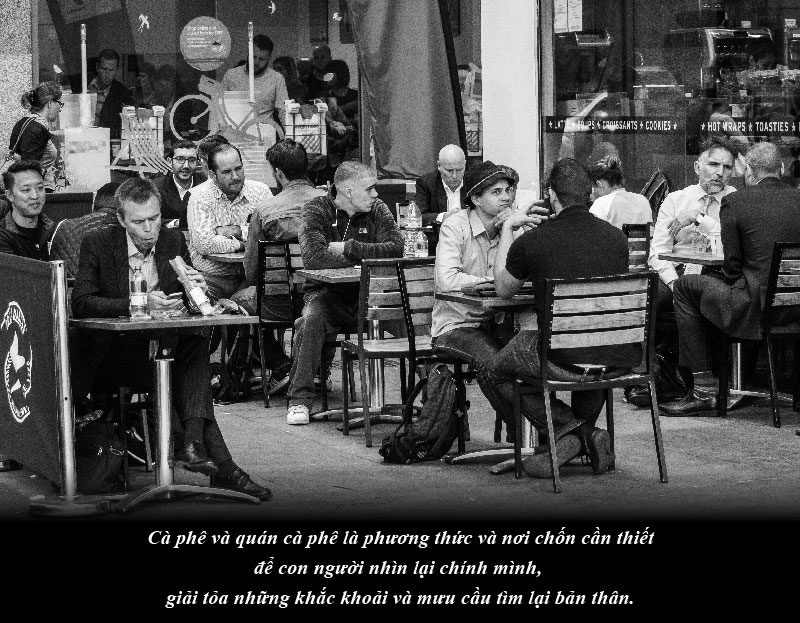
Coffee shops are a “typical social space”, promoting, reinforcing people’s beliefs about themselves, to explore and dare to live in the right choice.
At the end of the 20th century, coffee shops that were once cultural and artistic centers for young people gave way to a completely new coffee culture that upheld coffee enjoyment as moments of celebration of life. In 1983, the National Coffee Association of the US launched The Coffee Achievers campaign to introduce successful people to coffee, spreading the message “Coffee gives you the serenity to dream it and the vitality to do it!” The campaign brought together the “new generation of coffee lovers” including elite, influential people from all fields such as singer-songwriter David Bowie, Electric Light Orchestra, author Kurt Vonnegut, actress Jane Curtin, model Cicely Tyson, football player Ken Anderson…
By the 1990s, the important social context in television programs gradually changed from bars to cafes. Friends, Seinfeld – the two most popular sitcoms in the US and the program “Le Café C’est la Vie en Mieux – coffee is life bettered” popular throughout Western Europe have contributed to the enjoyment of coffee becoming a cultural trend.
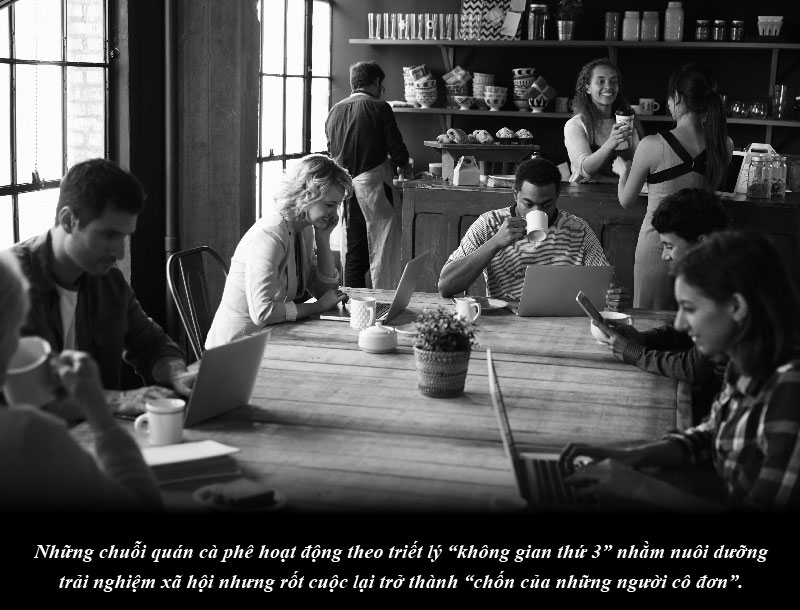
Coffee was promoted as thinking energy to discover new truths, create new valuable things.
Along with showing the meaning of coffee culture, a generation of young intellectuals chose the restructuring of coffee shops as a way to start a business, which was also the restructuring of their own image. The most famous them could be Donald Schoenholt – owner of the Gillies Coffee brand (USA), co-founder of the Specialty Coffee Association of America with the ideal “Rise up, my fine buckos, and assert your will”. Erna Knutsen entered the coffee industry as an effort to empower women. George Howell – the founder of Coffee Connection saw coffee as an aesthetic experience and pioneered in building an indigenous single-origin coffee supply chain. Or Bill Fishbein founded Coffee Exchange pursuing the goal of improving the lives of those who depend on the coffee industry…
Coffee shops celebrate life
Over time, many new trends in the field of coffee shop organization were formed. Starting with the rebirth of the theme coffee form still reverberating in the European subconscious, many new coffee shops were born in the direction of honoring the cafe as a living space. The Activist Coffee and Social Cafe operated as educational spaces for the community, including hosting talks or events designed to resolve specific challenges in society.
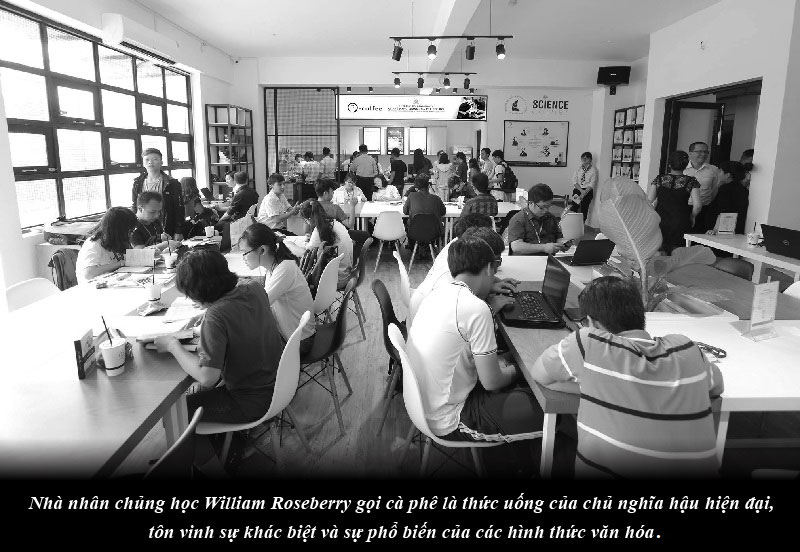
“The coffee shop is an essential place to understand social phenomena, it gives power to one’s life” – Gilles Gabellec, President of the Loleit-Levant Center for Socio-Culturalism.
The most famous of which is the philosophical coffee shop Café Philosophique (or café-philo) founded by philosopher Marc Sautet in Paris, France. Café Philosophique attempted to revive the Socratic period in Athens, when philosophers were still openly conversing in the “polis”. The cafe as a public forum became a “sidewalk academy” where people would gather together and discuss human issues over a cup of coffee. Café Philosophique brought philosophy back to the streets, so that everyone could learn about new ideas and express their own thinking as a path of personal discovery. After just over 5 years, the type of philosophic cafe developed throughout France and there are about 150 Café Philosophique worldwide.
The birth of the philosophical cafe promoted people to think, explore and realize that everyone can be a philosopher. From that inspiration, the scientific cafés Café Scientifique, the literary café Café Litteraire, the multilingual cafe Café Polyglotte, the religious cafe Cafés Religious… were born, bringing together a community that tended to train themselves to affirm their own cultural model and position.
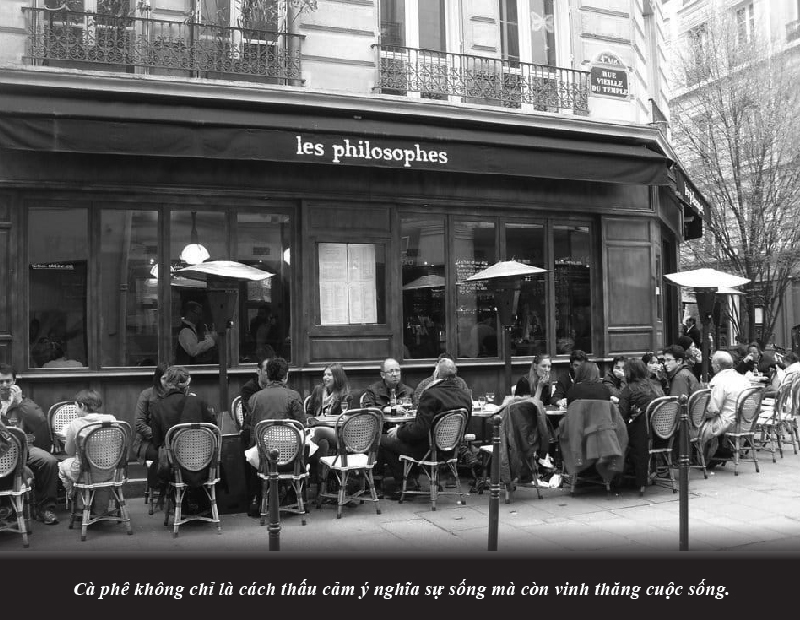
Coffee is not only a way to understand the meaning of life but also to celebrate it.
Another dimension is the Coffee Lounge category that was started by Australian airlines, designating private lounges for special guests. Coffee Lounge is decorated with airy space, creating an atmosphere of slow living, like the silence needed to look back at yourself in the constant hustle and bustle of life. Along with it is the Caffè Farniente trend. Farniente, originally from Italian, means time of settling down, being calm. People are sitting at the coffee shop to immerse themselves in contemplation, assessing the meaning of life.
It is no coincidence that coffee is promoted as a thinking energy to discover new truths, and coffee shops are hailed as a place of culture, of lifestyle. For by the side of the cup of coffee, in the coffee space that people feel proud of the freedom to pursue personal values. In each person there is a hidden desire for extraordinary, the desire to identify themselves closest to the ideal model, or always look forward to a future that they dream of. Ideal values do not come solely from subjective will but are also influenced by society, so the experiences that people have with a social space will definitely have a close relationship with and influence on thinking and behaviour.
THE REAL COFFEE
ROASTED ONLY FOR PEOPLE OF WISDOM!
Source: “The Philosophical Way of Coffee” – copyright by Trung Nguyen Legend


